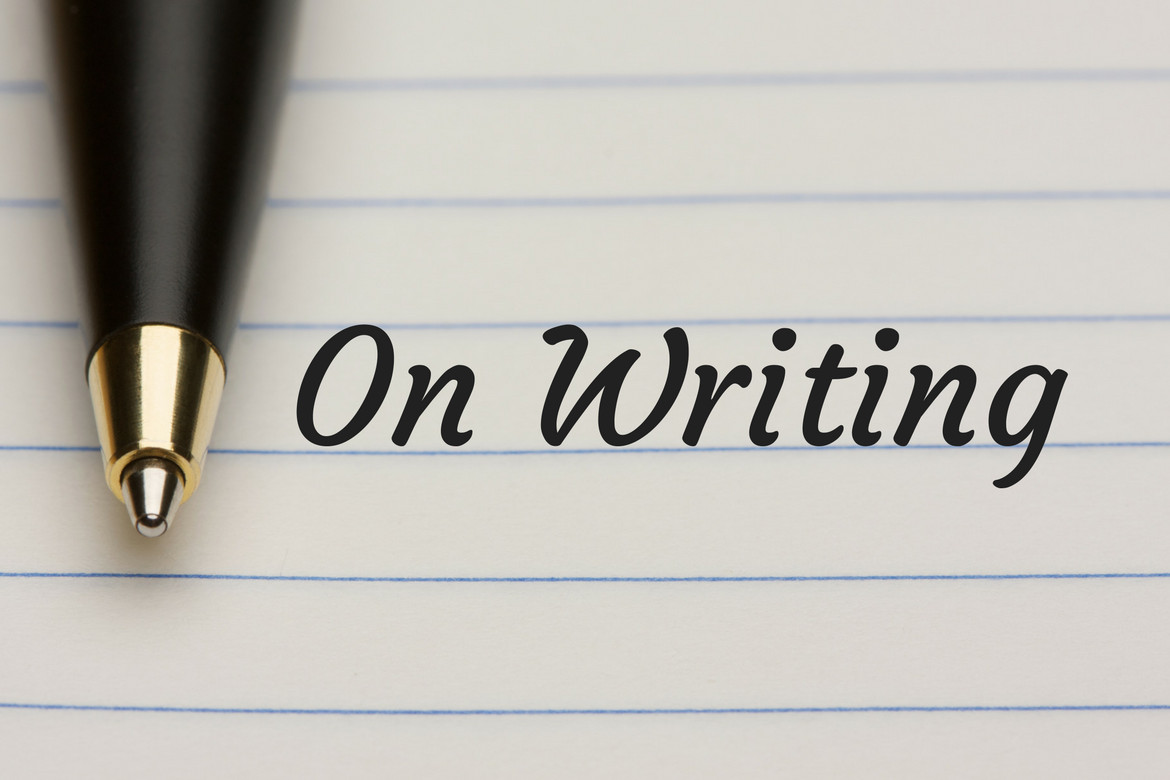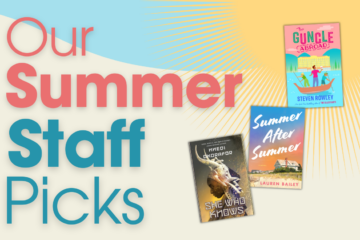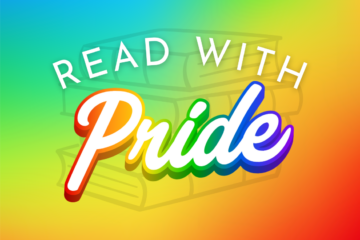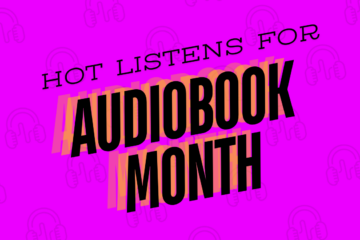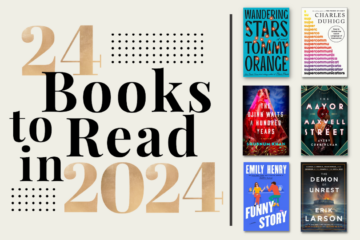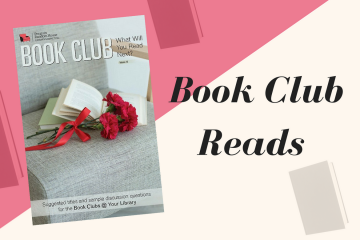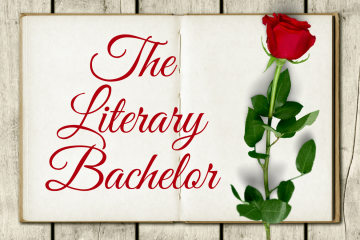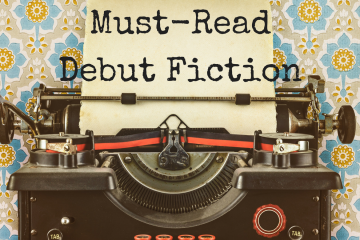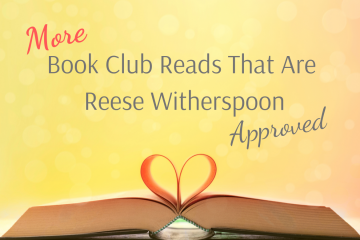November is National Novel Writing Month (NaNoWriMo) but sometimes, writing is hard. So, whether you’re sitting down to write your first novel, looking to improve your writing ability, or need to break free from writing in a vacuum, these reads will help to inspire your next page.
Click for More Inspirational Writing Reads.
Advice from Authors:
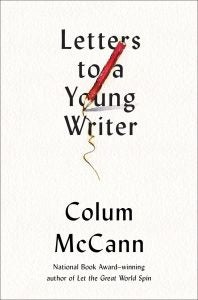
Letters to a Young Writer by Colum McCann
From the bestselling author of the National Book Award winner Let the Great World Spin a collection of fifty-two essays featuring lessons on how to be a writer, and so much more.
“A demonstration of how precision, care, and hard work are the writer’s crucial tools . . . [McCann] draws upon 20 years of teaching to offer more than 50 brief chapters focused on all stages of the writing process. Although intended for beginning writers, the volume would be helpful to experienced writers, as well.” —Kirkus Reviews
“Books on the writer’s craft traditionally cover practicalities—manuscript formatting, time management, obtaining agency representation, etc.—and this muscular collection of essays does, too, but in a voice charged with meaning.” —Library Journal (starred review)
Click to Read an Excerpt.
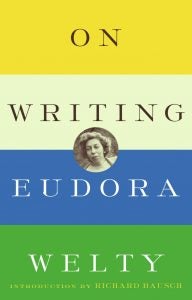
On Writing by Eudora Welty
Eudora Welty was one of the twentieth century’s greatest literary figures. For as long as students have been studying her fiction as literature, writers have been looking to her to answer the profound questions of what makes a story good, a novel successful, a writer an artist. On Writing presents the answers in seven concise chapters discussing the subjects most important to the narrative craft, and which every fiction writer should know, such as place, voice, memory, and language. But even more important is what Welty calls “the mystery” of fiction writing—how the writer assembles language and ideas to create a work of art.
Originally part of her larger work The Eye of the Story, On Writing is a handbook every fiction writer, whether novice or master, should keep within arm’s reach.
Click to Read an Excerpt.
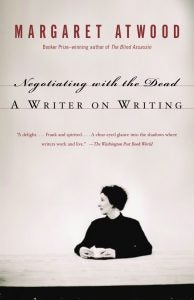
Negotiating with the Dead by Margaret Atwood
An ambitious inquiry into the art of writing and an unprecedented insider’s view of the writer’s universe, from the beloved author of The Handmaid’s Tale.
What do we mean when we say that someone is a writer? Is he or she an entertainer? An improver of readers’ minds and morals? And who, for that matter, are these mysterious readers? In this wise and irresistibly quotable book, one of the most intelligent writers working in English addresses the riddle of her art: why people pursue it, how they view their calling, and what bargains they make with their audience, both real and imagined. To these fascinating issues Booker Prize-winner Margaret Atwood brings a candid appraisal of her own experience as well as a breadth of reading that encompasses everything from Dante to Elmore Leonard.
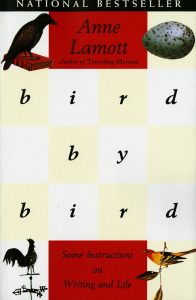
Bird by Bird by Anne Lamott
Advice on writing and on life from an acclaimed bestselling author:
“Thirty years ago my older brother, who was ten years old at the time, was trying to get a report on birds written that he’d had three months to write. It was due the next day. We were out at our family cabin in Bolinas, and he was at the kitchen table close to tears, surrounded by binder paper and pencils and unopened books on birds, immobilized by the hugeness of the task ahead. Then my father sat down beside him, put his arm around my brother’s shoulder, and said, ‘Bird by bird, buddy. Just take it bird by bird.’”
“A warm, generous and hilarious guide through the writer’s world and its treacherous swamps.” —Los Angeles Times.
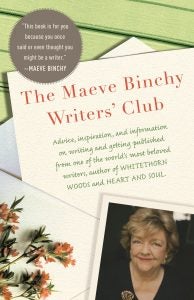
The Maeve Binchy Writers’ Club by Maeve Binchy
In this warm and inspiring guide, beloved author Maeve Binchy shares her unique insight to how a bestselling author writes: from finding a subject and creating good writing habits to sustaining progress and seeking a publisher.
Whether you want to write stories or plays, humor or mysteries, Binchy prescribes advice for every step with her signature humor and generous spirit. And once you are ready, an appendix offers of writing awards and competitions and a selection of websites and literary journals.
“The most important thing to realize is that everyone is capable of telling a story.”—Maeve Binchy
Click to Read an Excerpt.
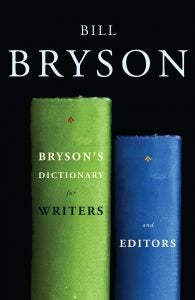
Bryson’s Dictionary of Troublesome Words by Bill Bryson
One of the English language’s most skilled and beloved writers guides us all toward precise, mistake-free usage.
As a copy editor for the London Times in the early 1980s, Bill Bryson felt keenly the lack of an easy-to-consult, authoritative guide to avoiding the traps and snares in English, and so he brashly suggested to a publisher that he should write one. Surprisingly, the proposition was accepted, and he proceeded to write that book—his first, inaugurating his stellar career.
Now, it has become Bryson’s Dictionary of Troublesome Words, more than ever an essential guide to the wonderfully disordered thing that is the English language. This precise, prescriptive, and–because it is written by Bill Bryson–often witty book belongs on the desk of every person who cares enough about the language not to maul or misuse or distort it.
Click to Read an Excerpt.
A Window Into the Creative Process:
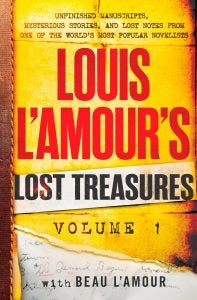
Louis L’Amour’s Lost Treasures: Volume 1 by Louis L’Amour
The first of its kind, a unique volume of twenty-one unpublished gems from one of the twentieth century’s most popular and prolific writers.
Exploring the creative process of an American original, the Louis L’Amour’s Lost Treasures project will uncover the hidden history behind the author’s best known novels . . . and his most mysterious and ambitious unfinished works.
In this first collection, Beau L’Amour presents many never-before-seen manuscripts. Using his father’s handwritten notes, journal entries, and correspondence, along with his own memories, Beau uncovers how and why they were written, as well as speculating about the ways they might have ended.
Illustrated with rare photographs and copies of handwritten notes, this book reveals the L’Amour you have never known, his personal struggles as a writer, and the contest between mortality and a literary legacy too big for one life to contain.
Click to Read an Excerpt.
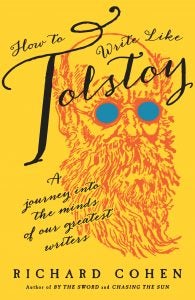
How to Write Like Tolstoy by Richard Cohen
For anyone who has ever identified with a hero or heroine, been seduced by a strong opening sentence, or been powerfully moved by a story’s end, How to Write Like Tolstoy is a thought-provoking journey inside the minds of the world’s most accomplished storytellers, from Shakespeare to Stephen King.
What made Nabokov choose the name Lolita? Why did Fitzgerald use first-person narration in The Great Gatsby? How did Kerouac, who raged against revision, finally come to revise On the Road? Veteran editor and teacher Richard Cohen draws on his vast reservoir of a lifetime’s reading and his insight into what makes good prose soar.
How to Write Like Tolstoy is a unique exploration of the act and art of writing that enriches our experience of reading both the classics and the best modern fiction. Evoking the marvelous, the famous, and the irreverent, he reveals the challenges that even the greatest writers faced—and shows us how they surmounted them.
“These twelve essays are like twelve perfect university lectures on the craft of writing fiction. The professor—or, in this case, author—succeeds in being not only knowledgeable but also interesting, charming, and engaging. . . . [Richard] Cohen reveals the possibilities that lie in wait when authors practice selection and intention, sparking the literary imagination.”—Library Journal (starred review)
Click to Read an Excerpt.
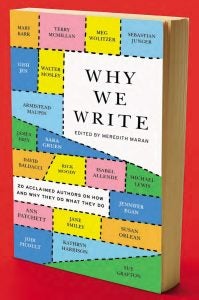
Why We Write by Meredith Maran
Twenty of America’s bestselling authors share tricks, tips, and secrets of the successful writing life.
Anyone who’s ever sat down to write a novel or even a story knows how exhilarating and heartbreaking writing can be. So what makes writers stick with it? In Why We Write, twenty well-known authors like Jodi Picoult and Ann Patchett, candidly share what keeps them going and what they love most—and least—about their vocation.
“If writing were illegal I’d be in prison. I can’t not write. It’s a compulsion.” —David Baldacci
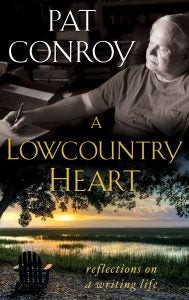
A Lowcountry Heart by Pat Conroy
This volume of Pat Conroy’s nonfiction brings together some of the most charming interviews, magazine articles, speeches, and letters from his long literary career, many of them addressed directly to his readers with his habitual greeting, “Hey, out there.” Ranging across diverse subjects, such as favorite recent reads, the challenge of staying motivated to exercise, and processing the loss of dear friends, Conroy’s eminently memorable pieces offer a unique window into the life of a true titan of Southern writing.
“Fans of Conroy . . . will relish the chance to spend more time with him in this glowing valedictory to his life and writing . . . Eloquent, folksy, and sometimes brutally honest.”—Publishers Weekly
Click to Read an Excerpt.
Writing Tips & Tricks:
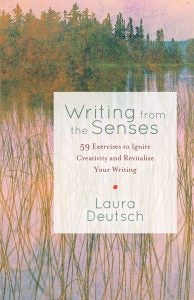
Writing from the Senses by Laura Deutsch
Break through writer’s block using your five senses!
The sensory details that infuse our everyday experience—the smell of a favorite dish cooking, the texture of a well-worn coat, hearing a song that reminds you of a person or a time in your life—can be used to add richness and spark to what we write. Whether you are a professional writer (or want to be one) or someone who enjoys just writing for your own personal fulfillment, Writing from the Senses will show you how to tap into an endless source of engaging material, using your senses as prompts. The exercises will stimulate you to develop stories, imagery, and details that will allow readers to see, taste, hear, smell, and feel that they’re in the scene.
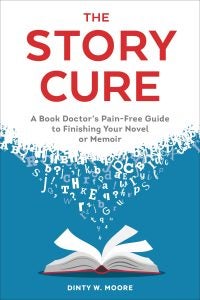
The Story Cure by Dinty W. Moore
A collection of cures for writer’s block, plotting and characterization issues, and other ailments writers face when completing a novel or memoir, prescribed by the director of creative writing at Ohio University.
People want to write the book they know is inside of them, but they run into stumbling blocks that trouble everyone from beginners to seasoned writers. Drawing on his years of teaching at both the university level and at writing workshops across the country, Professor Dinty W. Moore dons his book-doctor hat to present an authoritative guide to curing the issues that truly plague writers at all levels. His hard-hitting handbook provides inspiring solutions for diagnoses such as character anemia, flat plot, and silent voice, and is peppered with flashes of Moore’s signature wit and unique take on the writing life.
Click to Read an Excerpt.
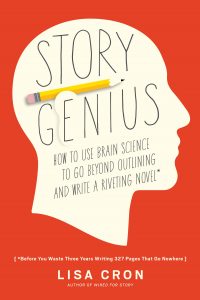
Story Genius by Lisa Cron
Following on the heels of Lisa Cron’s breakout first book, Wired for Story, this writing guide reveals how to use cognitive storytelling strategies to build a scene-by-scene blueprint for a riveting story.
It’s every novelist’s greatest fear: pouring their blood, sweat, and tears into writing hundreds of pages only to realize that their story has no sense of urgency, no internal logic, and so is a page one rewrite.
In Story Genius Cron takes you, step-by-step, through the creation of a novel from the first glimmer of an idea, to a complete multilayered blueprint—including fully realized scenes—that evolves into a first draft with the authority, richness, and command of a riveting sixth or seventh draft.
Click to Read an Excerpt.
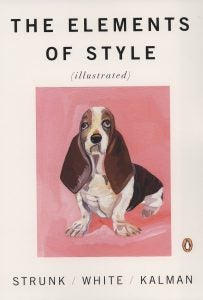
The Elements of Style Illustrated by William Strunk Jr. and E. B. White; Illustrated by Maira Kalman
Every English writer knows Strunk and White’s The Elements of Style. The book’s mantra, make every word tell, is still on point. This much-loved classic, now in its fourth edition, will forever be the go-to guide when in need of a hint to make a turn of phrase clearer or a reminder on how to enliven prose with the active voice. The only style manual to ever appear on bestseller lists has explained to millions of readers the basic principals of plain English, and Maira Kalman’s fifty-seven exquisite illustrations give the revered work a jolt of new energy, making the learning experience more colorful and clear.
Looking for Even More Writing Inspiration?
Our friends at Signature have created the Ultimate Writing Guide where you’ll receive writing advice from more than twenty-two seasoned authors like Jill Santopolo, Ammon Shea, Jan Karon, and Tess Gerritsen, and learn tips of the trade like how to banish writer’s block, how to revise a draft without losing your mind, and how to turn off your internal editor while writing.
It’s your one-stop writing experience.

